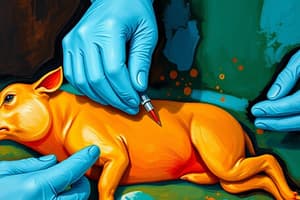Podcast
Questions and Answers
Which of the following is NOT a typical sign of estrus in cattle?
Which of the following is NOT a typical sign of estrus in cattle?
- Standing to be mounted by other animals
- Decreased activity and social interaction (correct)
- Vaginal discharge
- Increased bellowing or vocalization
What hormone is primarily responsible for inducing the behavioral changes associated with estrus?
What hormone is primarily responsible for inducing the behavioral changes associated with estrus?
- Estrogen (correct)
- Progesterone
- Luteinizing hormone (LH)
- Testosterone
Prostaglandin F2α is used in AI protocols to synchronize estrus by causing:
Prostaglandin F2α is used in AI protocols to synchronize estrus by causing:
- Maintenance of pregnancy
- Induction of ovulation
- Regression of the corpus luteum (correct)
- Stimulation of follicular development
Which of the following is a disadvantage of using AI compared to natural mating?
Which of the following is a disadvantage of using AI compared to natural mating?
Why is laparoscopic AI often preferred over cervical insemination when using frozen semen in sheep?
Why is laparoscopic AI often preferred over cervical insemination when using frozen semen in sheep?
What is the role of Gonadotropin-releasing hormone (GnRH) in AI protocols?
What is the role of Gonadotropin-releasing hormone (GnRH) in AI protocols?
Which semen collection method involves electrical stimulation of the pelvic nerves to induce ejaculation?
Which semen collection method involves electrical stimulation of the pelvic nerves to induce ejaculation?
What parameters are typically assessed when evaluating semen quality?
What parameters are typically assessed when evaluating semen quality?
What is the purpose of 'superovulation' in the context of artificial insemination and embryo transfer?
What is the purpose of 'superovulation' in the context of artificial insemination and embryo transfer?
Which of the following best describes the recto-vaginal technique used in AI?
Which of the following best describes the recto-vaginal technique used in AI?
In cattle AI, timed AI protocols are used to:
In cattle AI, timed AI protocols are used to:
Which of the following is NOT a benefit of using artificial insemination (AI) in livestock breeding programs?
Which of the following is NOT a benefit of using artificial insemination (AI) in livestock breeding programs?
What is the main purpose of adding antibiotics to semen extenders used in artificial insemination?
What is the main purpose of adding antibiotics to semen extenders used in artificial insemination?
Flashcards
Artificial Insemination (AI)
Artificial Insemination (AI)
Reproductive technology where semen is collected, stored, and placed in the female's reproductive tract for fertilization.
Estrus (Heat)
Estrus (Heat)
Period when a female animal is receptive to mating.
Estradiol's Role in Estrus
Estradiol's Role in Estrus
Hormone that induces behavioral changes associated with estrus.
Artificial Vagina for Semen Collection
Artificial Vagina for Semen Collection
Signup and view all the flashcards
Semen Quality Assessment
Semen Quality Assessment
Signup and view all the flashcards
Semen Extenders
Semen Extenders
Signup and view all the flashcards
Semen Cooling to 4°C
Semen Cooling to 4°C
Signup and view all the flashcards
Cryoprotectants
Cryoprotectants
Signup and view all the flashcards
Transcervical Insemination
Transcervical Insemination
Signup and view all the flashcards
Recto-vaginal Technique
Recto-vaginal Technique
Signup and view all the flashcards
Prostaglandins (PGF2α)
Prostaglandins (PGF2α)
Signup and view all the flashcards
Gonadotropin-Releasing Hormone (GnRH)
Gonadotropin-Releasing Hormone (GnRH)
Signup and view all the flashcards
Superovulation
Superovulation
Signup and view all the flashcards
Genetic Improvement (AI)
Genetic Improvement (AI)
Signup and view all the flashcards
Timed AI Protocols
Timed AI Protocols
Signup and view all the flashcards
Study Notes
- Artificial insemination (AI) is a widely used reproductive technology in cattle and sheep breeding programs
- AI entails collecting semen from a male, preserving and storing it, and then placing it into the female reproductive tract when fertilization is most likely
- AI enhances genetic traits, manages disease, and boosts reproductive effectiveness
- Key AI steps: recognizing estrus, gathering and treating semen, and using proper insemination methods
Estrus Detection
- Precisely identifying estrus is essential for successful AI
- Estrus, also known as heat, is when the female is ready to mate
- Observing the animal is a typical way to identify estrus
- Estrus signs include willingness to be mounted, more activity, bellowing, and vaginal discharge
- Heat detection patches change color when mounted, helping to spot animals in estrus
- Electronic systems track activity to detect when an animal is likely in estrus
- Hormones greatly influence estrus
- Estradiol, from the developing follicle, causes behavioral changes during estrus
- Progesterone, from the corpus luteum, stops estrus behavior
Semen Collection and Processing
- Semen collection methods: artificial vagina, electroejaculation, and seminal vesicle massage
- The artificial vagina mimics natural mating conditions and is commonly used for collecting bull semen
- Electroejaculation involves using electrical stimulation on pelvic nerves to cause ejaculation
- Semen quality is judged by volume, concentration, motility, and morphology
- Semen is mixed with extenders to increase insemination doses and provide nutrients and protection during freezing
- Extenders usually contain buffers, energy sources (like glucose), antibiotics, and cryoprotectants (like glycerol)
- Semen is gradually cooled to 4°C for short-term storage or frozen in liquid nitrogen at -196°C for long-term storage
- Cryoprotectants protect sperm cells from damage during freezing and thawing
- Semen is stored and used for insemination in straws or ampules
Insemination Technique
- An insemination gun is typically used for AI
- The insemination gun places semen in the uterus or cervix
- Transcervical insemination is the most common method in cattle
- Transcervical insemination involves inserting the insemination gun through the cervix to deposit semen into the uterine body
- The recto-vaginal technique uses rectal manipulation to guide the insemination gun through the cervix
- In sheep, insemination depends on whether fresh or frozen semen is used
- Vaginal insemination can be used for fresh semen
- Laparoscopic insemination is often preferred for frozen semen, placing it directly into the uterus
Hormones and Drugs in AI
- Hormones and drugs are frequently combined with AI to regulate the estrous cycle and improve conception rates
- Prostaglandins (e.g., prostaglandin F2α) synchronize estrus by causing luteolysis (corpus luteum regression)
- Prostaglandins cause estrus within a predictable time
- Gonadotropin-releasing hormone (GnRH) induces ovulation or synchronizes follicular development
- GnRH stimulates the release of luteinizing hormone (LH) and follicle-stimulating hormone (FSH) from the pituitary gland
- Progesterone synchronizes estrus or maintains pregnancy
- Progesterone is given through intravaginal devices like controlled internal drug release (CIDR) inserts or injections
- Estrogen induces estrus in anestrous animals, but its use is less common due to regulatory concerns
- Superovulation uses FSH to stimulate multiple follicular development
- Superovulation is commonly used in embryo transfer programs
- Antibiotics are sometimes added to semen extenders to prevent bacterial contamination and improve sperm survival
Advantages of AI
- Genetic improvement is achieved by using superior sires
- Disease control prevents the transmission of venereal diseases
- Increased reproductive efficiency allows more females to be bred to a single male
- Reduced risk of injury to both males and females
- Greater flexibility in breeding programs
Disadvantages of AI
- Requires skilled technicians and proper equipment
- Relies on accurate estrus detection
- Conception rates may be lower than with natural mating in some cases
- Labor intensive
Considerations Specific to Cattle
- Cattle AI is highly prevalent globally
- AI in cattle contributes significantly to genetic gain for traits like milk production, growth rate, and carcass quality
- Timed AI protocols combine hormonal treatments with fixed-time insemination, and are widely used to eliminate the need for estrus detection
Considerations Specific to Sheep
- AI is less common in sheep compared to cattle, but its use is increasing
- AI in sheep can improve genetic merit for traits like wool production, growth rate, and lambing percentage
- Laparoscopic AI is more common in sheep due to the complex anatomy of the ewe's reproductive tract
- Cervical insemination is also used, but can have lower success rates due to cervical structure
Studying That Suits You
Use AI to generate personalized quizzes and flashcards to suit your learning preferences.




